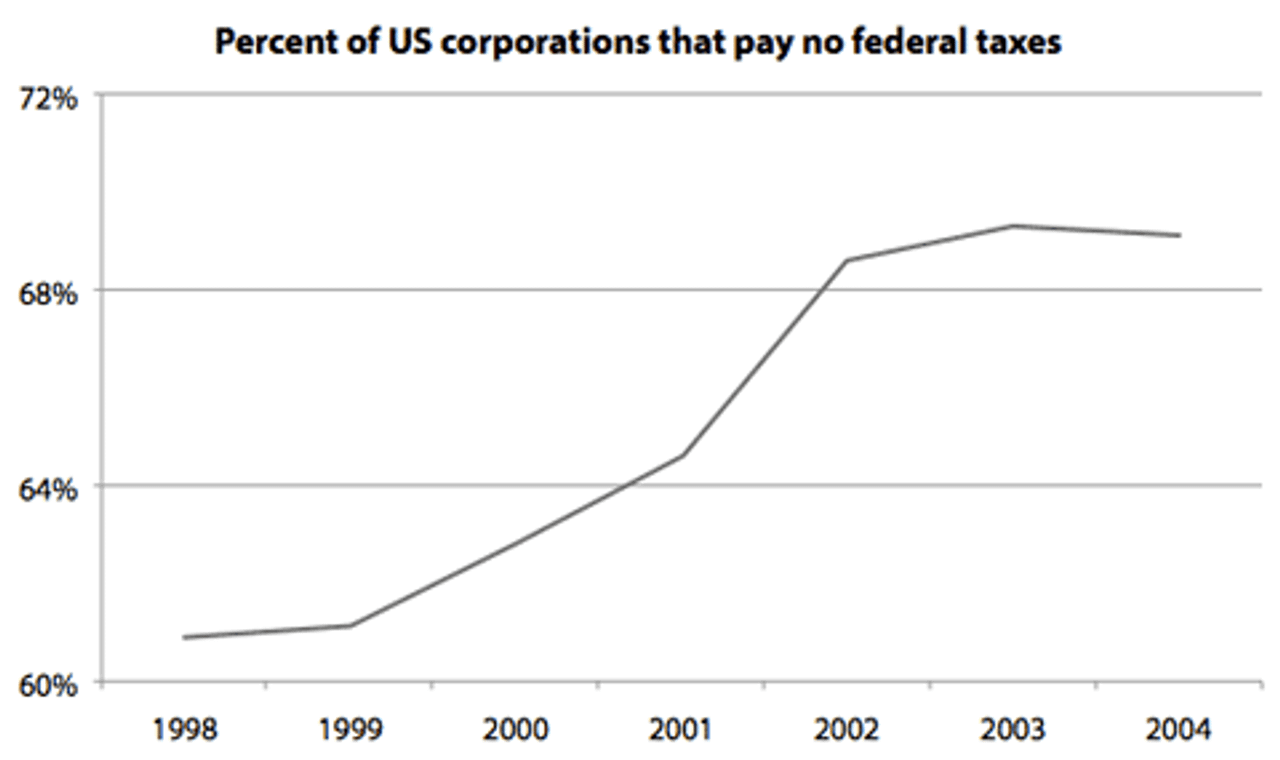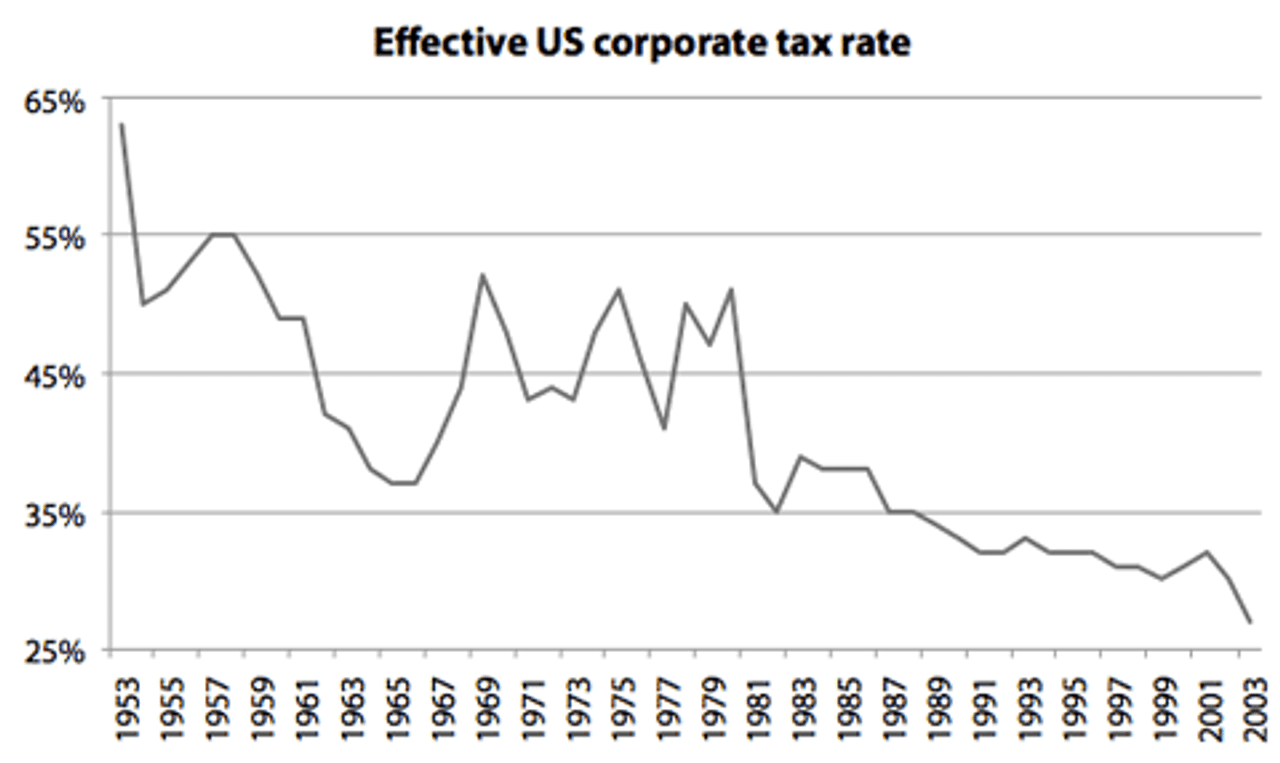Last week, the New York Times reported that, in addition to paying no federal income taxes this year, General Electric (GE), the largest US corporation, is set to get a tax credit from the government of $3.2 billion.
The news generated no small public outcry, coming as workers and small business owners prepared to file their own taxes in anticipation of the April deadline. But GE’s latest tax bill only points to the general rule: unlike regular people, most American corporations do not pay federal income tax.
GE made $14.1 billion in profits in 2010, $5.1 billion of which came from its US operations.
While the story received prominent coverage on most television networks, it was conspicuously absent from NBC News, broadcast on the NBC television network, part-owned by General Electric.
GE spent $2.7 million on lobbying last year in the US alone, and employs hundreds of accountants and lawyers to help it make the most of the tax loopholes set up for it through its lobbying efforts. The company was able to get by with such a staggeringly low tax figure through convoluted accounting, much of which involves channeling profits into its offshore subsidiaries.
GE’s public relations department went into full swing in response to the Times’ report, with the company issuing statements on its web site and on Twitter suggesting that the newspaper was wrongt. But in response to the Times’ offer to correct proven inaccuracies, the corporation was unable to demonstrate any.
The news came one month after the Company’s CEO, Jeffrey R. Immelt, was named the head of the White House’s Council on Jobs and Competitiveness. In addition to fighting for legislation even more favorable to his own company, Immelt will certainly encourage the trend by which US corporations pay next to no taxes.
The fact that GE paid no income tax this year—and instead received billions in government tax credits—is the result of a long process spanning decades by which the effective tax rate for corporations has fallen.
A 2006 study [PDF] by Alan J. Auerbach of UC Berkeley found that the proportion of federal government revenue derived from corporate taxes fell from about 23 percent in the late 1960s to 15 percent in 2006. The percentage of GDP accounted for by federal corporate taxes fell from a high of 4 percent in the late 1960s to about 2.7 percent in 2006.
Corporate income taxes on the state and local level have fallen even faster, plummeting 40 percent between 1978 and 2004, according to a 2005 study [PDF] by the Institute on Taxation and Economic Policy.
But over the past ten years, the decline has become even sharper. David Cay Johnston, writing on tax.com, said that amid a general decline in tax revenues between 2000 and 2010, “corporate [federal] income tax receipts fell 27 percent and declined 34 percent per capita, even though profits boomed, rising 60 percent.”
A 2008 Government Accountability Office study [PDF], aimed at determining whether foreign companies operating in the United States were paying lower taxes than those based in the US, was forced to admit that most companies make their profits tax-free, whether foreign or domestically owned.
 The report found that in 2003, nearly 70 percent of US corporations paid no corporate income tax. During the period of the study, which reviewed corporate tax filings between 1998 and 2005, there was a significant increase in the percentage of companies that reported no income taxes, from 60.9 percent in 1998 to 66.7 in 2005.
The report found that in 2003, nearly 70 percent of US corporations paid no corporate income tax. During the period of the study, which reviewed corporate tax filings between 1998 and 2005, there was a significant increase in the percentage of companies that reported no income taxes, from 60.9 percent in 1998 to 66.7 in 2005.
The real tax rate that corporations pay has been declining for years. In 1953, the effective corporate tax rate was 63 percent. By 2003, it had been cut by more than half, to 27 percent, according to a 2004 congressional research report.
 The official US corporate tax rate currently stands at 35 percent, down significantly from the 1969 level of 52.8 percent. The rate has been cut continuously, but the sharpest cuts came during the 1980s, when the rate was cut from 46 to 34 percent.
The official US corporate tax rate currently stands at 35 percent, down significantly from the 1969 level of 52.8 percent. The rate has been cut continuously, but the sharpest cuts came during the 1980s, when the rate was cut from 46 to 34 percent.
But even this figure far overvalues the actual rate at which corporations pay taxes—when they do so at all. Groups such as the Tax Foundation, and “free market” economists who have used its data—have claimed that the US corporate tax rate is higher than the average for European countries, which the Tax Foundation said was 30 percent.
But the US corporate tax rate is more than offset by the immense quantity of tax loopholes introduced in decades of lobbying and political corruption. As a result, the amount of revenue raised by corporate taxes, as a percentage of economic output, is significantly less in the United States than in Japan, Italy, France, Germany, the United Kingdom, Spain and almost every other developed country.
The persistent fall in corporate taxes has been a significant contributor to the overall decline in federal tax revenue, which has fallen by 36 percent between 2000 and 2010, according to a recent analysis on tax.com. This crisis, the result of the systematic reduction of taxes on the rich and corporations over decades, is now being used to justify the layoffs of hundreds of thousands of government workers, the destruction of essential social services, and the impoverishment of a whole society.
